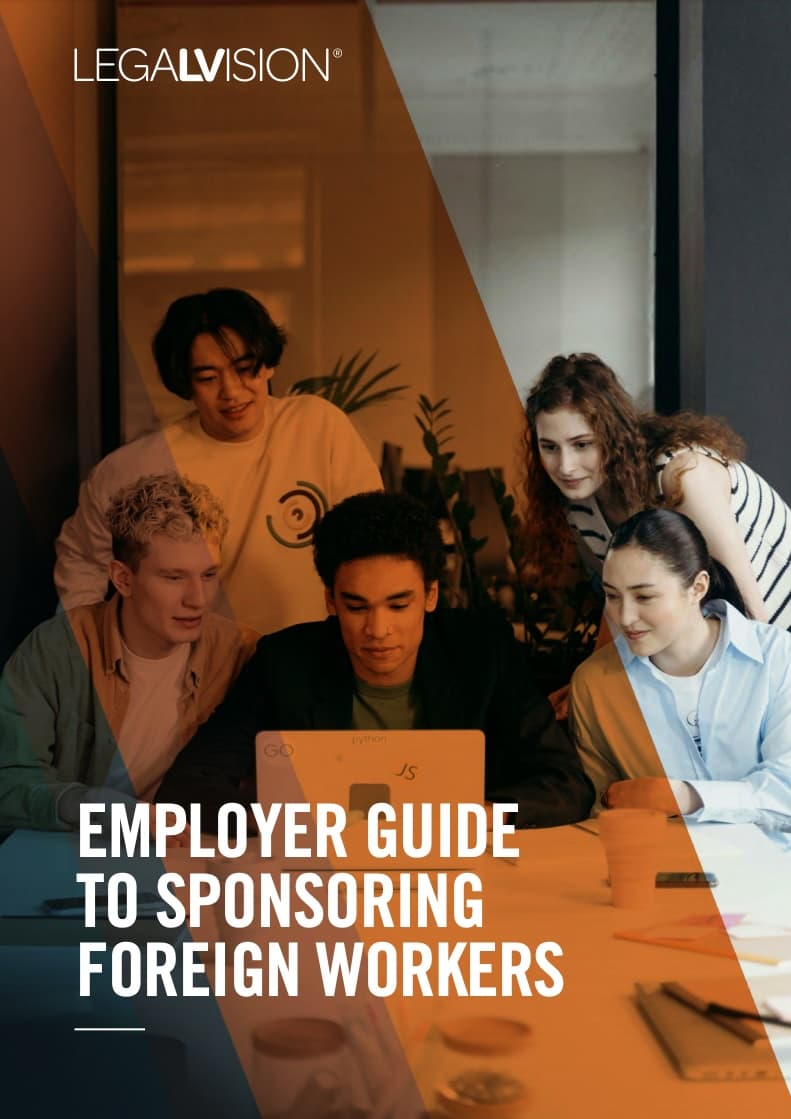In Short
- Employers must meet strict obligations when sponsoring foreign workers, including paying above-market rates and maintaining accurate records.
- Failing to comply can result in severe penalties, including fines, reputational damage and loss of sponsorship privileges.
- Regular audits, training and legal advice are crucial to staying compliant with evolving laws.
Tips for Businesses
Keep detailed records of all sponsorship activities and ensure you meet wage and working condition standards for sponsored employees. Stay informed about legislative changes and regularly audit your compliance to avoid penalties. Additionally, work with legal experts to ensure your business meets sponsorship obligations and avoids costly mistakes.
On this page
- The Changing Face of Employer Compliance
- Key Obligations for Approved Business Sponsors
- Consequences of Non-Compliance
- Strategies for Ensuring Compliance
- The Role of the Australian Border Force
- Responding to a Notice of Intention to Take Administrative Action (NOITTA)
- Key Takeaways: The Path Forward for Approved Business Sponsors
- Frequently Asked Questions
In the evolving landscape of Australian immigration law, employers who are approved standard business sponsors for foreign workers on visas such as Subclass 482 and 494 face an increasingly complex web of obligations. Recent legislative changes, including the Migration Amendment (Strengthening Employer Compliance) Bill 2023 (‘the Bill’), have significantly raised the stakes for compliance. This article aims to shed light on the importance of adhering to sponsorship obligations and the potential consequences of non-compliance for Australian businesses.
The Changing Face of Employer Compliance
The Australian government has recently taken decisive steps to address the exploitation of migrant workers and strengthen employer compliance. These measures come in response to alarming findings, such as one in six recent migrants being paid less than the minimum wage. The government’s commitment to tackling this issue is evident in several key developments:
- the Bill;
- the Fair Work Legislation Amendment (Protecting Worker Entitlements) Act 2023; and
- a $50 million budget allocation to support Australian Border Force (ABF) officials in enforcing compliance.
Key Obligations for Approved Business Sponsors
As an approved business sponsor, you must be acutely aware of your responsibilities. These obligations include, but are not limited to:
- ensuring sponsored workers are paid at or above the market salary rate;
- providing work that aligns with the nominated occupation;
- maintaining accurate records of sponsorship activities;
- notifying the Department of Home Affairs of certain events or changes;
- cooperating with inspectors and providing requested information; and
- ensuring sponsored workers do not work in breach of their visa conditions.
Call 1300 544 755 for urgent assistance.
Otherwise, complete this form, and we will contact you within one business day.
Consequences of Non-Compliance
The ramifications of failing to meet sponsorship obligations can be severe and multifaceted.
1. Financial Penalties
Under the new legislation, maximum civil and criminal penalties have been increased. Employers found to have employees or contractors working in breach of their obligations can face fines of up to $123,000 for each offence. This represents a significant financial risk for businesses of all sizes.
2. Criminal Charges
The Bill introduces criminal offences for employers who unduly coerce or pressure temporary migrant workers to work in breach of their visa conditions. This means that if you do not comply, you could face not just financial penalties, but also criminal prosecution.
3. Prohibition from Engaging Temporary Migrant Workers
Employers identified as having engaged in migrant worker exploitation may be prohibited from engaging temporary migrant workers in the future. This can severely impact businesses that rely on skilled overseas talent to fill crucial roles.
4. Reputational Damage
Non-compliance can result in significant reputational damage. In an age where corporate social responsibility is increasingly important, being associated with worker exploitation can lead to a loss of customers, partners and investors.
5. Increased Scrutiny and Audits
Businesses found to be non-compliant are likely to face increased scrutiny from authorities. This can result in more frequent audits and inspections, causing operational disruptions and increased administrative burdens.
6. Personal Liability for Directors and Executives
Directors and executives can be held personally liable for non-compliance. This means that the consequences of failing to meet sponsorship obligations can extend beyond the business to affect individual leaders personally.

Sponsoring overseas workers as an Australian business is complicated. Let us simplify it for you with this free employer guide.
Strategies for Ensuring Compliance
To mitigate the risks associated with non-compliance, approved business sponsors should implement robust strategies:
- Comprehensive Record-Keeping: Maintain detailed and accurate records of all sponsorship activities, including contracts, pay slips, timesheets and correspondence related to sponsored employees.
- Regular Internal Audits: Conduct regular internal audits to ensure ongoing compliance with sponsorship obligations. This should include reviews of pay rates, work conditions and visa statuses.
- Continuous Monitoring of Visa Status: Implement systems to continuously monitor the visa status, work rights and personal details of sponsored employees. This includes checking:
- visa status and expiry dates;
- passport validity;
- work rights;
- personal details (name and address);
- education course information (for student visa holders); and
- relationship status (for secondary applicants).
- Training and Education: Provide regular training to HR personnel and managers on sponsorship obligations and the importance of compliance. Ensure they are up-to-date with the latest legislative changes.
- Clear Communication with Employees: Maintain open lines of communication with sponsored employees. Ensure they understand their rights and the conditions of their visas.
- Engagement with Experts: Consider engaging immigration lawyers or consultants to provide ongoing advice and support in navigating the complex landscape of sponsorship obligations.
- Prompt Response to Issues: If any non-compliance issues are identified, address them promptly and thoroughly. This may involve self-reporting to the Department of Home Affairs and implementing corrective measures.
The Role of the Australian Border Force
The ABF plays a crucial role in enforcing compliance with sponsorship obligations. Under the new legislation, ABF officials have expanded powers, including:
- issuing enforceable undertakings to employers suspected of engaging in migrant worker exploitation;
- issuing compliance notices; and
- conducting site visits and inspections.
Responding to a Notice of Intention to Take Administrative Action (NOITTA)
If you receive a Notice of Intention to Take Administrative Action (NOITTA), it is crucial to respond promptly and effectively. A NOITTA indicates that the Department of Home Affairs has concerns about your compliance with your obligations.
Key steps in responding to a NOITTA include:
- carefully review the allegations and gathering all relevant evidence;
- provide a comprehensive written response addressing each concern;
- demonstrate steps taken to rectify any identified issues; and
- consider engaging legal representation to assist with the response.
A well-prepared response to a NOITTA can help mitigate potential consequences and demonstrate the sponsor’s commitment to compliance.
Key Takeaways: The Path Forward for Approved Business Sponsors
As the regulatory environment becomes increasingly stringent, approved business sponsors must prioritise compliance with their sponsorship obligations. The consequences of non-compliance are too severe to ignore, potentially jeopardising not just the employment of sponsored workers but the very future of your sponsoring business.
You can successfully navigate these challenges by:
- implementing robust compliance strategies;
- maintaining meticulous records; and
- staying informed about legislative changes.
Remember, compliance is not just about avoiding penalties; it is about fostering a fair and ethical work environment that benefits both Australian and migrant workers.
Ultimately, businesses that embrace their sponsorship obligations and make compliance a core part of their operations will be better positioned to thrive in Australia’s diverse and dynamic workforce. As we move forward, the message is clear: compliance is not optional. It is a fundamental responsibility and a key to sustainable business success in Australia’s evolving immigration landscape.
If you have any questions about your new sponsorship obligations, our experienced immigration lawyers can assist as part of our LegalVision membership. For a low monthly fee, you will have unlimited access to lawyers who can answer your questions and draft and review your documents. Call us today at 1300 544 755 or visit our membership page.
Frequently Asked Questions
Businesses can stay informed by regularly reviewing government updates, engaging legal experts and conducting internal audits. Additionally, providing ongoing training for HR personnel ensures compliance with the latest legislative changes in sponsorship requirements.
Breaching sponsorship obligations can result in fines, cancellation of sponsorship approval, increased scrutiny and potential disqualification from sponsoring future employees. These penalties aim to enforce compliance and prevent the exploitation of migrant workers. Additionally, depending on the breach, you could now be liable for criminal penalties.
We appreciate your feedback – your submission has been successfully received.












